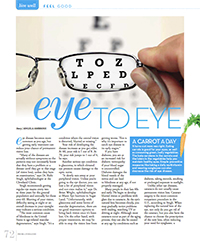 Eye disease becomes more common as you age, but getting early treatment can reduce your chance of permanent vision loss.
Eye disease becomes more common as you age, but getting early treatment can reduce your chance of permanent vision loss.
“Many of the diseases are actually without symptoms so the patients may not necessarily know that they have a problem or a disease until they get to that stage (of vision loss), unless they have an examination,” says Dr. Rishi Singh, ophthalmologist at the Cleveland Clinic.
Singh recommends getting regular eye exams every two to three years for the general population and annually for those over 60. Blurring of your vision, difficulty seeing at night or an overall decrease in your eyesight may indicate a serious condition.
“The most common cause of blindness in the United States is age-related macular degeneration,” says Singh. “It’s a condition where the central vision is distorted, blurred or missing.” Your risk of developing the disease increases as you get older. At 60, your risk is 1 out of 8. At 70, your risk jumps to 1 out of 4, he says.
Another serious eye condition is glaucoma, in which elevated eye pressure causes damage to the optic nerve. “It slowly eats away at your peripheral vision. Unless you’re going to the eye doctor, you can lose a lot of peripheral vision and not even realize it,” says Dr. Brian Wright, ophthalmologist at Mann Eye Institute in Sugar Land, Tex. “Unfortunately, with glaucoma and some forms of macular degeneration, there are no good treatment options to bring back vision once it’s been lost. On the other hand, with proper treatments, we may be able to stop the vision loss from getting worse. This is why it’s important to catch eye disease in its early stages.”
If you have diabetes, you are at an increased risk for diabetic retinopathy if your blood sugar is uncontrolled. Diabetes damages the blood vessels of the retina and can lead to blindness at any age, if not properly managed.
Many people in their late 60s and early 70s begin to develop blurred vision or problems with glare due to cataracts. As the eye’s natural lens becomes cloudy, you may gradually notice problems with reading, watching TV or driving at night. Although most cataracts occur as part of the aging process, they can also be caused at any age by conditions such as diabetes, taking steroids, smoking or prolonged exposure to sunlight.
Unlike other eye diseases, cataracts do not usually cause permanent vision loss. Cataract surgery is the most common outpatient procedure in the U.S., according to Singh. When replacing the natural lens of the eye, not only do you get rid of the cataract, but you also have the chance to choose the prescription of the new lens, often reducing your need for eye glasses.
It turns out mom was right. Eating carrots is good for your eyes, as well as consuming green leafy vegetables. The beta-carotene in the carrots and the lutein in the green leafy vegetables help you maintain healthy eyes. Simple preventive measures like taking a daily multi-vitamin and wearing sunglasses can also decrease the risk of eye disease.